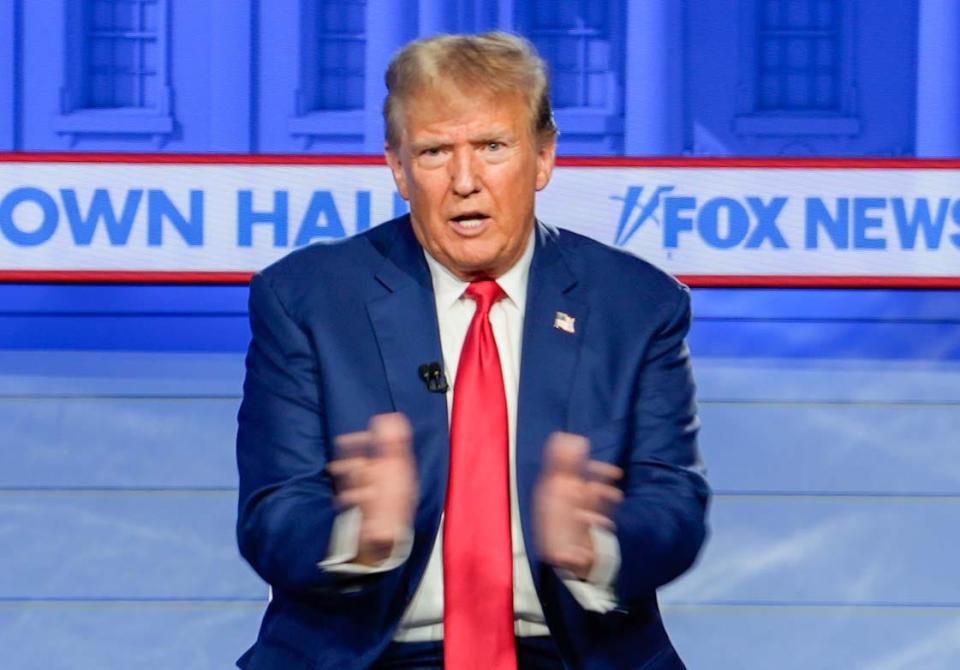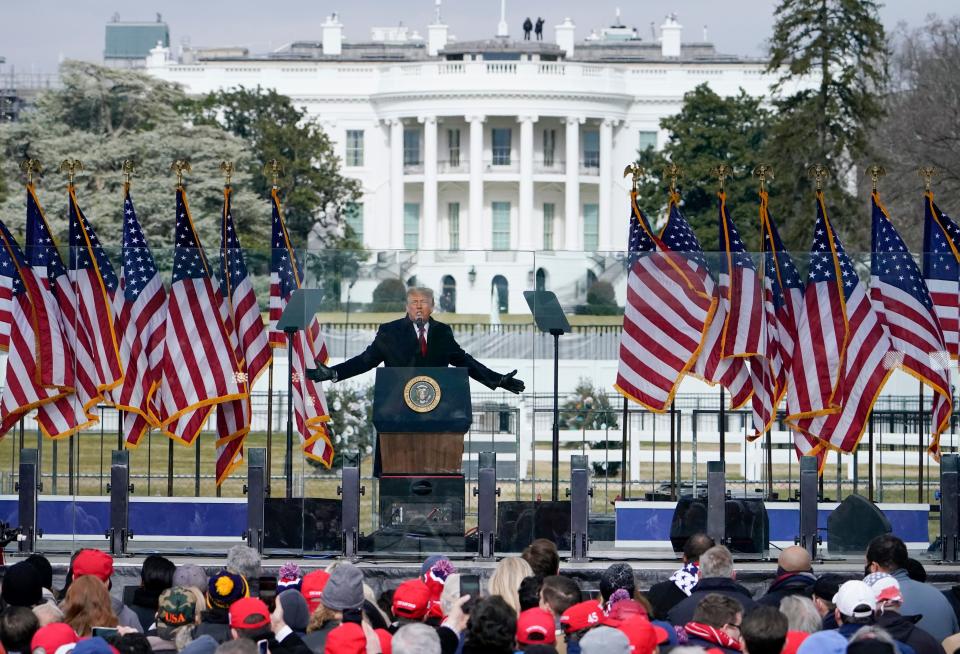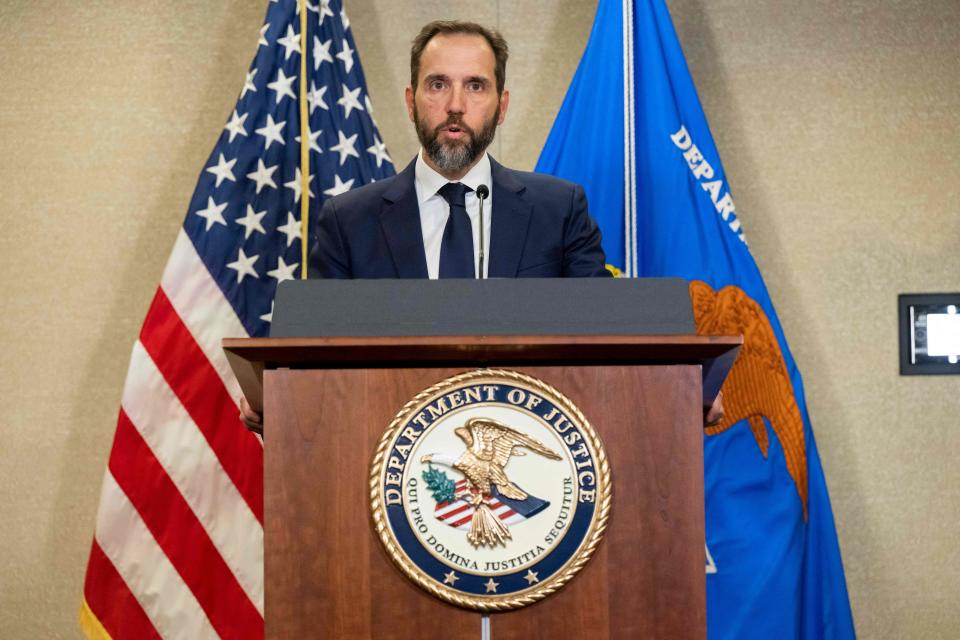No immunity: Donald Trump can be tried on election interference charges, appeals court says
- Oops!Something went wrong.Please try again later.
WASHINGTON – A federal appeals panel ruled unanimously Tuesday that Donald Trump isn't immune to charges he tried to overturn the 2020 election, setting the stage for another potential showdown at the Supreme Court for the former president.
Trump is expected to appeal the decision, which rejected an argument from his lawyers last month that any act by a president − even ordering the murder of political opponents by U.S. Navy SEALS − cannot be prosecuted unless the president is first impeached by the House of Representatives and convicted in the Senate.
But a three-judge panel of the D.C. Circuit Court of Appeals ruled that Trump is not immune from prosecution.
"Former President Trump lacked any lawful discretionary authority to defy federal criminal law and he is answerable in court for his conduct," the panel ruled.
A spokesperson for Trump's presidential campaign said the former president respectfully disagreed with the decision and that he would appeal, and Trump himself denounced the ruling.
"A President will be afraid to act for fear of the opposite Party’s Vicious Retribution after leaving Office," Trump said in a post on Truth Social. "It will become a Political Weapon used for Election Interference. Even our Elections will be corrupted and under siege."
Trump has pursued cases to the Supreme Court repeatedly over issues such as executive privilege, congressional access to his tax returns and for the review of classified documents found at his Mar-a-Lago estate. But The Supreme Court hasn't always supported Trump, despite his having appointed three of the nine members. The high court scheduled arguments Thursday over whether he can remain on the ballot in Colorado.
The Immunity case marked the first chance for a federal appeals court to gauge a former president's criminal liability because Trump is the first one to be charged. Each side claims the Constitution and historical precedent are on their side.
“It's a landmark decision, but in many ways an easy decision,” said Michael Waldman, CEO of the Brennan Center for Justice and a constitutional lawyer. “It makes clear that presidents are not above the law. It is bullet proof.”
The case could eventually reach the Supreme Court, where Justice Department special counsel Jack Smith last month asked for a ruling. But the high court said the appeals court should weigh in first.
The panel postponed sending the decision back to the District Court until Feb. 12, to give Trump a chance to appeal to the Supreme Court. The panel said if Trump asks for a review by the entire circuit, sending the decision back to the District Court would not be postponed unless the case were accepted for rehearing.
The case was decided by a three-judge panel. Judge Karen Henderson was appointed by George H.W. Bush, and Michelle Childs and Florence Pan were each appointed by Joe Biden.
"For the purpose of this criminal case, former President Trump has become citizen Trump, with all of the defenses of any other criminal defendant," the panel ruled. "But any executive immunity that may have protected him while he served as President no longer protects him against this prosecution."

Judges asked about a president ordering SEAL Team 6 to murder a political rival
Trump's lawyer John Sauer had argued that a president is shielded from criminal charges for his actions while in office because otherwise political rivals could seek to punish him for contentious policy decisions. Sauer argued a president would have to be impeached and convicted in a Senate trial before he could be charged with killing a political rival, accepting bribes or committing treason.
Judge Pan asked Sauer whether he was saying the president “could sell pardons, could sell military secrets, could order SEAL Team 6 to assassinate a political rival.”
Sauer replied that a president would be swiftly impeached and convicted for murder. But he said otherwise the Supreme Court has held that a president’s official acts are never reviewable by the courts.
“There is a political process that would have to occur under our Constitution," Sauer said. “If there’s no impeachment ever, and no conviction, then the official acts are immune. Period."
A prosecutor, assistant special counsel James Pearce, voiced concern for the country’s future if presidents could kill rivals or sell national secrets and suffer no consequences without an impeachment and conviction.
The appeals panel rejected Trump’s argument that the potential for criminal prosecutions of former presidents would inhibit their actions in office.
“We conclude that the interest in criminal accountability, held by both the public and the Executive Branch, outweighs the potential risks of chilling Presidential action and permitting vexatious litigation,” the panel wrote. “We conclude that the risk that former Presidents will be unduly harassed by meritless federal criminal prosecutions appears slight.”
Trump, who attended the appeals hearing, was impeached in the House of Representatives on charges he incited the insurrection Jan. 6, 2021, but he was acquitted in the Senate trial.
The panel ruled that Trump's position would threaten the government's separation of powers between executive, judicial and legislative branches.
"At bottom, former President Trump’s stance would collapse our system of separated powers by placing the President beyond the reach of all three Branches," the panel ruled. "Presidential immunity against federal indictment would mean that, as to the President, the Congress could not legislate, the Executive could not prosecute and the Judiciary could not review."
U.S. District Judge Tanya Chutkan had scheduled the trial for March 4, but postponed it under after the appeals are exhausted. Trump has sought to push this and three other criminal trials he faces until after the November election, as he campaigns again for the White House.

What are the charges Trump is seeking to dismiss?
Trump has pleaded not guilty to four federal charges − three for conspiracy and one for obstruction − for falsely claiming election fraud and trying to overturn the legitimate election results.
Prosecutors contend the conspiracies culminated with the Capitol attack on Jan. 6, 2021. The riot temporarily prevented Congress from certifying Biden's victory, forced lawmakers and then-Vice President Mike Pence to flee and injured more than 140 police officers.
What is Trump's argument?
Trump's lawyers argued that the Constitution and the country's founders believed the president should be shielded from criminal prosecution to protect the office from political antagonists.
"No prosecutor, judge, or jury may sit in judgment over the President’s official acts," Sauer wrote in his filing. "A President’s official acts 'can never be examinable by the courts,'" he wrote, quoting one of the earliest Supreme Court decisions.
The Senate’s acquittal of Trump at an impeachment trial charging him with inciting the insurrection at the Capitol prevented him from being tried again for the same events, Sauer argued. The Senate voted 57-43 to convict Trump, but a two-thirds majority was required for conviction.
“A president of the United States must have full immunity, without which it would be impossible for him/her to properly function,” Trump said in an all-caps post on Truth Social on Jan. 18. “Even events that ‘cross the line’ must fall under total immunity, or it will be years of trauma trying to determine good from bad.”
The appeals judges disagreed.
"We cannot accept former President Trump's claim that a President has unbounded authority to commit crimes that would neutralize the most fundamental check on executive power − the recognition and implementation of election results," the panel wrote.
Alice Clapman, a senior counsel at the Brennan Center for Justice, said Trump's legal argument for relying on a Senate conviction could allow lawmakers representing just 14% of the country's population to prevent a criminal prosecution. She called impeachment "totally different" from the criminal justice system.
"It's essentially a political decision," she said of impeachment. "He's just trying to fit a square peg into a round hole."

What have prosecutors argued?
Smith's team argued that historical precedent, the principles of the separation of powers between branches of government and the Constitution all make clear that a former president can be charged criminally.
Lawyers for the special counsel argued that Trump’s claim of immunity would prevent prosecution of a president who accepts a bribe in exchange for directing a lucrative government contract, a president who instructs the FBI to plant evidence on a political enemy, a president who orders the National Guard to murder his critics or a president who sells nuclear secrets to an adversary.
“Under the defendant’s framework, the Nation would have no recourse to deter a President from inciting his supporters during a State of the Union address to kill opposing lawmakers – thereby hamstringing any impeachment proceeding – to ensure that he remains in office unlawfully,” assistant special counsel James Pearce wrote.
The appeals panel wrote that safeguards against prosecutors charging former presidents include grand juries preventing "arbitrary fishing expeditions" or initiating investigations "out of malice or an intent to harass."
"Additionally, former President Trump’s 'predictive judgment of a torrent of politically motivated prosecutions 'finds little support in either history or the relatively narrow compass of the issues raised in this particular case,'" the panel ruled, citing a decision involving former President Bill Clinton, "as former President Trump acknowledges that this is the first time since the Founding that a former President has been federally indicted."
"Weighing these factors, we conclude that the risk that former Presidents will be unduly harassed by meritless federal criminal prosecutions appears slight," the panel added.
This article originally appeared on USA TODAY: Trump gets no immunity from federal election charges: Appeals court

